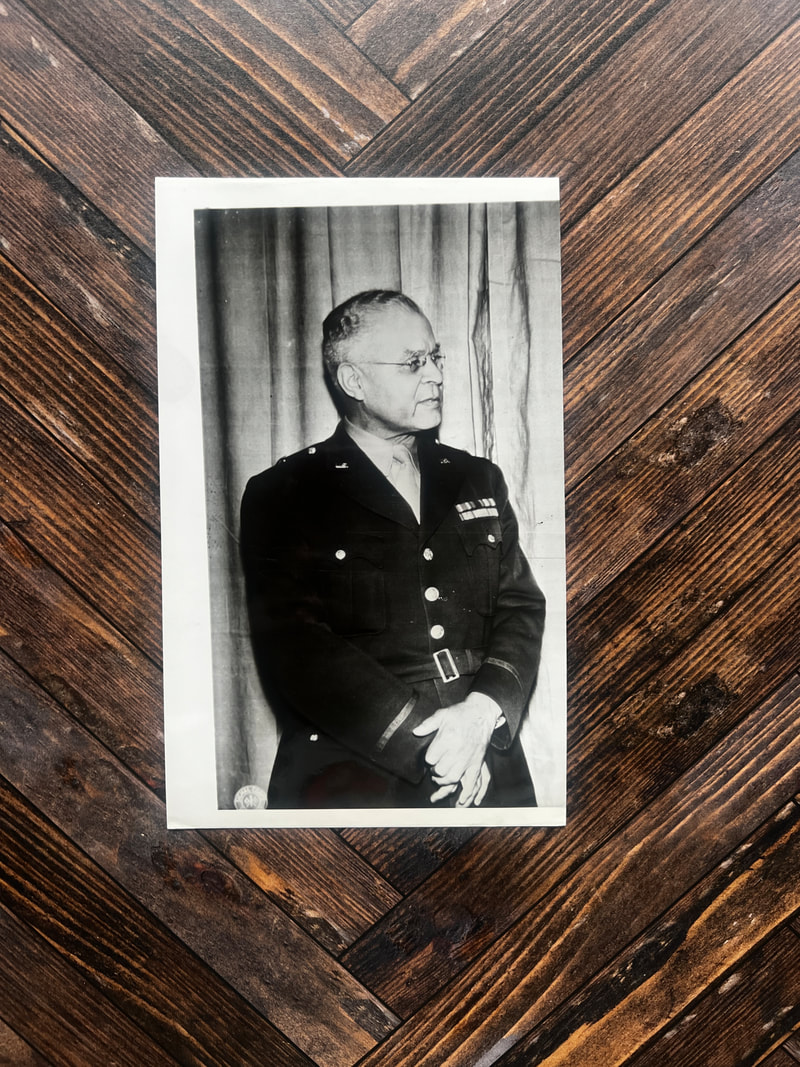PR241
August 17, 1944 - Press Photo
Brig. Gen. Benjamin O. Davis
1st US Army Negro Gen.
Benjamin Oliver Davis Sr. (July 1, 1877 – November 26, 1970) was a career officer in the United States Army. One of the few black officers in an era when American society was largely segregated, in 1940 he was promoted to brigadier general, the army's first African American general officer.
A native of Washington, D.C., Davis attended M Street High School, where he obtained his first military experience by participating in the school's corps of cadets program. During his senior year, he also enrolled in courses at Howard University, which enabled him to play on the school's football team. After his 1898 graduation, Davis served briefly as a second lieutenant in the District of Columbia National Guard before joining the 8th U.S. Volunteer Infantry for the Spanish–American War and receiving his commission as a first lieutenant. After the war, Davis was discharged from the volunteersand joined the regular army as a private. He soon became a non-commissioned officer, and in 1901 passed the commissioning exam and received appointment as a second lieutenant of Cavalry.
Davis served in the Philippine–American War and World War I, in which he demonstrated noteworthy leadership and administrative ability, but found himself frequently shunted to less than desirable assignments as his career progressed. In addition to receiving less prestigious assignments such as professor of military science at historically black colleges because of segregation in the army, as one of only a handful of black officers he also experienced delays in promotions and disapproval of recommendations for professional education such as the United States Army Command and General Staff College. Despite these challenges, Davis worked within the army's white hierarchy to attain a record of superior technical and tactical proficiency as he slowly rose through the ranks. He was promoted to colonel in 1930, and commanded the New York National Guard's 369th Infantry Regiment(later the 369th Anti-Aircraft Artillery Regiment) from 1938 to 1940.
Though he was near retirement, political considerations during the 1940 United States presidential election, the need to obtain the support of black citizens for U.S. involvement in World War II and Davis's own long record of accomplishments led to his promotion to brigadier general. He commanded 4th Cavalry Brigade, 2nd Cavalry Division during its organization and training, and also served as acting division commander. He attained the mandatory retirement age of 64 in 1941, but remained on active duty to perform wartime inspections of black units and offer observations and recommendations on policies including racial integration.
Davis retired in 1948 and resided in Washington, D.C. He was a member of the American Battle Monuments Commission from 1953 to 1961. Davis later moved to Chicago to reside with one of his daughters. He died at Great Lakes Naval Hospital on November 26, 1970. Davis was buried at Arlington National Cemetery. Davis's children included Benjamin O. Davis Jr., the first black general in the United States Air Force.
A native of Washington, D.C., Davis attended M Street High School, where he obtained his first military experience by participating in the school's corps of cadets program. During his senior year, he also enrolled in courses at Howard University, which enabled him to play on the school's football team. After his 1898 graduation, Davis served briefly as a second lieutenant in the District of Columbia National Guard before joining the 8th U.S. Volunteer Infantry for the Spanish–American War and receiving his commission as a first lieutenant. After the war, Davis was discharged from the volunteersand joined the regular army as a private. He soon became a non-commissioned officer, and in 1901 passed the commissioning exam and received appointment as a second lieutenant of Cavalry.
Davis served in the Philippine–American War and World War I, in which he demonstrated noteworthy leadership and administrative ability, but found himself frequently shunted to less than desirable assignments as his career progressed. In addition to receiving less prestigious assignments such as professor of military science at historically black colleges because of segregation in the army, as one of only a handful of black officers he also experienced delays in promotions and disapproval of recommendations for professional education such as the United States Army Command and General Staff College. Despite these challenges, Davis worked within the army's white hierarchy to attain a record of superior technical and tactical proficiency as he slowly rose through the ranks. He was promoted to colonel in 1930, and commanded the New York National Guard's 369th Infantry Regiment(later the 369th Anti-Aircraft Artillery Regiment) from 1938 to 1940.
Though he was near retirement, political considerations during the 1940 United States presidential election, the need to obtain the support of black citizens for U.S. involvement in World War II and Davis's own long record of accomplishments led to his promotion to brigadier general. He commanded 4th Cavalry Brigade, 2nd Cavalry Division during its organization and training, and also served as acting division commander. He attained the mandatory retirement age of 64 in 1941, but remained on active duty to perform wartime inspections of black units and offer observations and recommendations on policies including racial integration.
Davis retired in 1948 and resided in Washington, D.C. He was a member of the American Battle Monuments Commission from 1953 to 1961. Davis later moved to Chicago to reside with one of his daughters. He died at Great Lakes Naval Hospital on November 26, 1970. Davis was buried at Arlington National Cemetery. Davis's children included Benjamin O. Davis Jr., the first black general in the United States Air Force.



